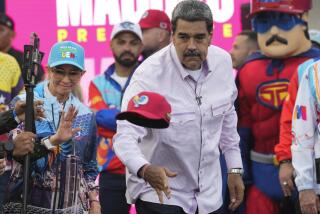Moderate Contra Leaders to Stay On, Press Reforms
- Share via
WASHINGTON — Two moderate Nicaraguan rebels announced Thursday that they have called off their threats to resign from the contra leadership and decided to press for a program of reforms instead.
But the contra leaders, Arturo Cruz and Alfonso Robelo, set a deadline of mid-April for the changes they seek in the U.S.-funded rebel armies and warned that they will quit then if their demands are not met.
The decision marked at least a temporary truce in the contras’ long-running internal struggle for power, but several rebel officials said they were skeptical that the arrangement would last.
“This is only the fifth or sixth round of a 15-round bout,” a Cruz aide said.
Cruz and Robelo had threatened to resign if the power of the largest and most conservative faction, the Nicaraguan Democratic Force (FDN), was not reduced.
That threat prompted several key members of Congress to warn that they would not support the Reagan Administration’s request for $105 million in aid to the rebels later this year if Cruz resigned. Those warnings, in turn, propelled the State Department and the CIA to work to bring the squabbling rebel factions back together.
The root of the problem, as Cruz, Robelo and some State Department officials saw it, was that the FDN and its leader, Adolfo Calero, were refusing to accord the moderates their fair share of power. The Nicaraguan Democratic Force commands about 15,000 of the 18,000 troops the rebels claim to have. With that much power on the ground, Calero clearly overshadowed his two moderate allies.
But the FDN’s domination of the rebel effort hurt the Administration’s chances of winning renewed aid because several of the FDN’s top commanders once fought for the rightist dictatorship of Anastasio Somoza that ruled Nicaragua until 1979.
The two factions also clashed frequently over political strategy, as the moderates argued in favor of negotiations with Nicaragua’s leftist regime and the conservative FDN remained more skeptical.
Quits UNO Post
On Monday, FDN leader Calero bowed to pressure from the Administration and resigned as one of the three directors of the United Nicaraguan Opposition, the contras’ umbrella alliance.
But Calero said he planned to remain as leader of the Nicaraguan Democratic Force--which would leave him in control of the largest rebel force.
Cruz and Robelo’s reform proposals, announced here Thursday, were an attempt to outmaneuver Calero on that count. The two moderates said their main demands were that the new alliance leadership take control of the FDN armed forces and that two small armed groups outside the alliance be brought in “for more balance,” Cruz said.
“The directorate (of the alliance) must be in command,” he said. “We want to have one national rebel army.”
When asked whether that meant the FDN should be dissolved, Robelo replied: “We’re not talking about dissolving anything; we’re talking about a real integration.” But he added that, if the reforms succeeded, the FDN “would have no need to exist.”
Hopes for Cooperation
The two moderates said that they had high hopes for cooperation from the FDN and that the FDN’s leadership had pledged to work with them.
Calero, in a telephone interview from his home in Miami, said he was willing to cooperate--but added that the FDN has a right to retain “its own structure and its own identity.”
“In order for all the organizations to integrate into one big organization, there has to be a consensus. We have to agree,” he said.
Calero added that he believes the alliance leadership should be restructured again, with more members. “And I’ll be a candidate,” he said.
Aides to Cruz and Robelo noted that their mid-April deadline could put the next showdown over power in the middle of a congressional debate over aid to the contras for this fiscal year.
“We’re satisfied now,” Robelo said. “But if it is not put into practice today, tomorrow the whole thing could explode.”
More to Read
Sign up for Essential California
The most important California stories and recommendations in your inbox every morning.
You may occasionally receive promotional content from the Los Angeles Times.














